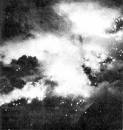A Formula That Works
 There was a time when German film makers scorned the formulas of American movies and (horrors) TV dramas. On the contrary, the postwar struggle to depict -- or not depict -- the horrors of the Nazi past kept obsessively clear of anything that smacked of Hollywood.
There was a time when German film makers scorned the formulas of American movies and (horrors) TV dramas. On the contrary, the postwar struggle to depict -- or not depict -- the horrors of the Nazi past kept obsessively clear of anything that smacked of Hollywood.I am not sure exactly when that changed, but one milestone was the American TV miniseries Holocaust, which despite being lambasted by critics, drew a massive audience in West Germany in 1979 and opened an unprecedented public discussion of the topic.
Since then, German TV has become very adept at making American-style miniseries, borrowing every trick in the book, including the much scorned device of placing a love story center stage, with cataclysmic historical events as backdrop. What the critics miss, though, is that a formula does not determine the quality of the result. Artistry does.
In the right hands, the TV miniseries can do amazing things. Case in point: the 2006 German production Dresden, now available on DVD in the US. The cataclysmic backdrop is the firebombing of that city, said to be the most beautiful in Germany, by the British Royal Air Force in 1945 -- an act that some have compared with America's dropping of atomic bombs on the Japanese cities of Hiroshima and Nagasaki.
Predictably in a production that carefully weighs the guilt of both sides, the love story is between an English pilot shot down over Dresden a few days before the firebombing and a German nurse who helps him. Conveniently, the pilot (John Light) is the German-speaking son of a German mother; so he and the lovely Anna (Felicitas Woll) have no trouble communicating their way into romance.
I was not one of the critics who disliked Holocaust. Of course it did not do justice to its topic. But surely some awareness in the popular mind is better than none. And the same can be said of Dresden. If your reaction to that immense act of destruction was "they deserved it," I won't argue. But see this film anyway. It treads a delicate path between showing the evil of the regime (the scales tip deeply toward Germany's greater guilt) and reminding us that along with a horrendous load of guilt, Germany carries a horrendous memory of suffering. And compared with some countries in the world, the Germans work very hard at coming to terms with both. Even at the price of borrowing formulas from the USA.
July 19, 2009 8:03 PM
| Permalink
